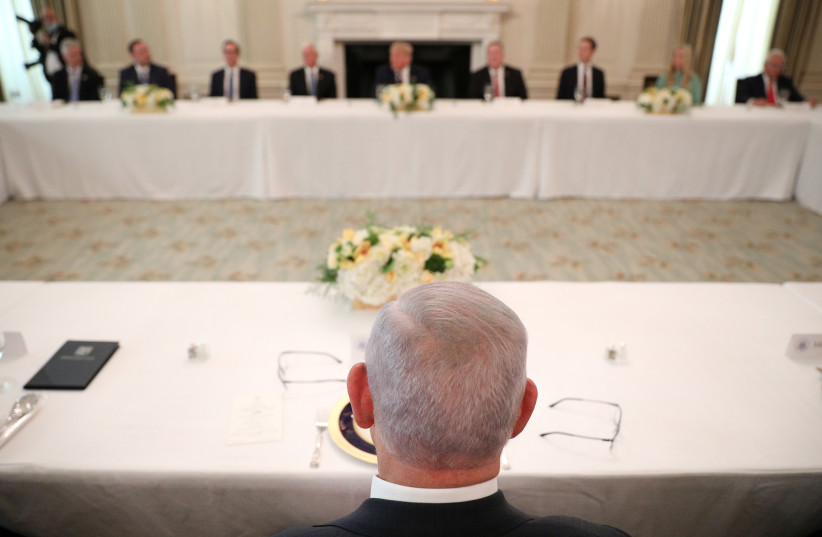Four years ago, I stood watching the signing of the Abraham Accords with cautious optimism. Could peace truly take root in the Middle East? I wanted to believe in the vision presented – a chance for longstanding adversaries to build bridges, not just for symbolic gestures, but for genuine security, stability, and prosperity. Now, as I look at the current landscape, I’m convinced that the success of the Abraham Accords is only the beginning.
We need an Abraham Accords 2.0, and the urgency has never been more palpable. Today, Iran’s influence in the region has intensified to a point that demands a decisive response. It has spread its power through Lebanon, Syria, Iraq, and Yemen, arming militias, proxies, and terrorist groups, destabilizing countries across the Middle East. This isn’t just about rivalries or regional tensions; It’s about survival and security for the countries living in the shadow of Iran’s ambitions. And that’s why I believe the Accords must expand, bringing together more nations in a unified coalition against the threat of Iranian hegemony.
Despite the ongoing war in Gaza, the Abraham Accords have held strong. No signatory has wavered; not a single embassy has closed its doors. The UAE, for example, has publicly stated that it has no intention of cutting ties with Israel; instead, it has used its position in the region to facilitate humanitarian aid to Gazans, proving that cooperation doesn’t weaken in the face of challenges.
This is a powerful signal: these relationships are resilient, built on mutual interests that transcend immediate crises. They are precisely the kind of alliances that can provide a strong front against Iranian aggression.
We have an opportunity now, with the anticipated return of Donald Trump to office. It was his administration that helped broker these historic agreements, and I believe he has the insight and commitment to push them further.

With Iran growing bolder, expanding the Abraham Accords into a 2.0 phase – one rooted in strategic security partnerships and defense cooperation – could be a game-changer for the entire region.
Countries such as Saudi Arabia and Oman, both with vested interests in countering Iran, should be brought into the fold. With their inclusion, we wouldn’t just have a patchwork of treaties; we’d have a coalition with the power to deter and defend.
The missing piece: Saudi Arabia
Saudi Arabia is, in many ways, the missing piece. The economic and security benefits of normalizing ties with Israel are clear, but perhaps even more compelling is the shared interest in standing against Iran’s power grab. With the US on board, an Israel-Saudi agreement could lay the foundation for a robust Arab-Israeli alliance – a coalition that sends a clear message to Tehran that its ambitions will meet a united resistance.
The reality is that peace and stability in the Middle East will require more than agreements on paper; they need to be backed by meaningful, practical cooperation. We’ve already seen what’s possible when countries work together in a real, coordinated defense: Back in April, Israel, Jordan, and the UAE are reported to have cooperated to intercept Iranian missiles targeting Israel. This is the kind of tangible security alliance the Abraham Accords 2.0 could foster. It would make clear that Iran is not dealing with isolated players but with a collective force.
We’ve also witnessed the power of economic partnerships, with trade between Israel and the UAE alone reaching nearly $3 billion since the signing of the Accords. This isn’t just about commerce; it’s about creating interdependence, establishing mutual interests that go beyond politics. These growing ties – trade, tourism, innovation – are the pillars of what I call “warm peace.” They make peace durable, resilient in the face of regional tensions.
Renewed Abraham Accords would be more than an alliance
An expanded Abraham Accords would not just be an alliance; it would be a new balance of power in the Middle East, one that counters Iran’s influence with strength and cooperation. For Arab and Muslim states, aligning with Israel isn’t just a political choice, it’s a strategic necessity. Iran’s shadow has loomed large for too long, and the stakes are simply too high to remain on the sidelines.
With Trump poised to resume his role as a champion of these accords, we have a window of opportunity to take this bold step. It’s not just about defending our interests; it’s about building a future in which Iran’s shadow no longer dictates our region’s fate.
The Abraham Accords 2.0 isn’t just an option – it’s the path forward for a Middle East defined not by division but by a united front that can ensure peace, security, and strength for generations to come.
The writer is a new immigrant from France who made aliyah in October 2022. She currently works as the press and media coordinator for the Zionist Organization of America, where she advocates for Zionist values and supports pro-Israel initiatives globally.
